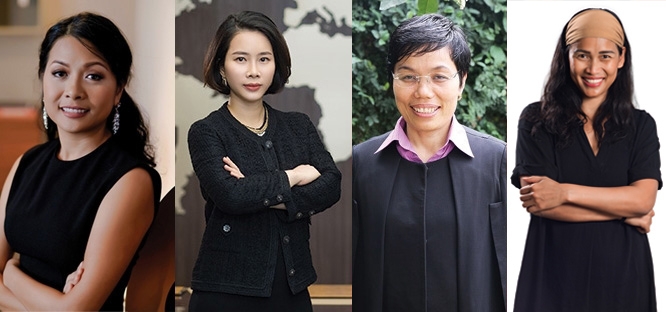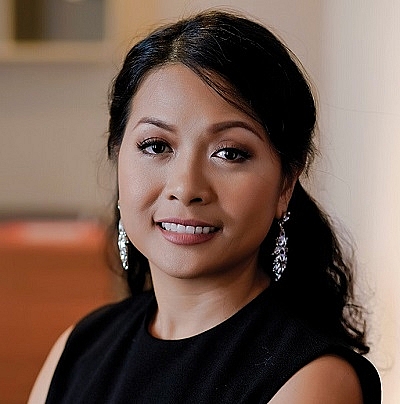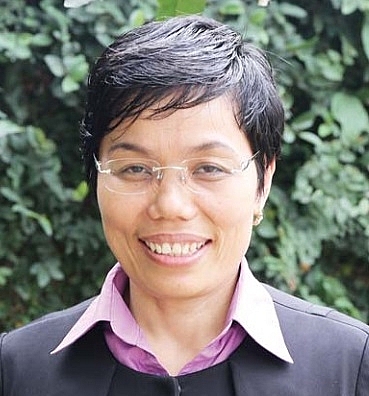Titans of female entrepreneurship
 |
Tran Uyen Phuong - Competing with global giants
 |
Globalisation, along with consumer desire for localisation, allows family-owned companies to not only grow but also be able to compete with major business giants such as McDonald’s, Starbucks, Coca-Cola, and Home Depot.
Accompanying the development and successes of Tan Hiep Phat Beverage Group, deputy CEO Tran Uyen Phuong always retains in her mind the key principles of leading a private business towards walking alongside other giants in the region, as well as in the wider world.
Thanks to Phuong’s parents, who were aspiring entrepreneurs in the 1970s, today Tan Hiep Phat is the largest family-owned enterprise in the fast-moving consumer goods market in Vietnam, with more than 5,000 staff nationwide. The company accounts for 15-20 per cent of domestic market share and in terms of the healthy drinks segment, Tan Hiep Phat leads the market with 50 per cent of the share.
To transform a good business idea into a real business and, over time, into a domestic, regional, or even a global champion, Phuong shared with VIR that they have always been guided to follow several principals since her parents started the family-owned business.
Creating true domestic products is one of the top values for a private business, according to Phuong. “Authentic domestic products are strongly competitive because they are the only ones perfect for any successful marketing for product, price, promotion, and location. They understand intimately their target markets and easily approach and satisfy consumers,” she said, adding that multinational corporations are often inferior in this aspect as they consider those criteria inconsequential.
For Phuong, compliance with international standards in operations makes it easy for third parties to understand better the company and the quality of its products. Regardless of the company’s current scope or influence, adopting best practices is helpful in sourcing, manufacturing, and distribution.
Small enterprises desire to widen their scale; however, merely growing should not be set as a focal target. “If IT systems and operating processes are not well-planned, they are very vulnerable to serious problems when scaling up. Failure to recognise the necessity of technology will lead to waste of time, resources and opportunities,” Phuong said.
Moreover, nurturing a sense of community and encouraging staff creates a company culture which is critical in its success. When employees, managers and customers can establish strong rapport, the company can establish itself in the market and instil its core values in all the stakeholders. These practices become increasingly important as the company develops.
“We are imperfect. We all make mistakes and my family is no exception. One lesson we have carved out is to successfully manage ourselves for the leadership towards others working at Tan Hiep Phat,” Phuong shared. “We consider Tan Hiep Phat as our family, no matter if it is at work or at a family meeting, we plan out and keep in mind what we will do, how to do it, and the responsibility of each member in the pursuit of our goals.”
Phuong emphasised that closely upholding these golden principles will help any private enterprise of any scale, just like at Tan Hiep Phat, and will help businesses develop more sustainably and earn greater achievements.
Le Thi Hoang Yen - Vietnamese brands from luxury to relaxation
 |
CEO of Muong Thanh Hospitality Group, Le Thi Hoang Yen, is the second generation of leaders at a huge private Vietnamese enterprise managing the top 60 hotels nationwide, and in Laos.
As the private sector in Vietnam is being pushed to become the driving force of the country’s market economy, Yen is successfully leading the authentic Vietnamese hotel chain towards sustainable development.
The private sector has been a key contributor to Vietnam’s socio-economic growth over recent years, and the scale and quantity of private entrepreneurs are getting larger and larger. They are sharp and professional in the process of establishing, operating, and managing businesses as well as in increasingly applying and updating the latest global developments in technology.
At Muong Thanh, Yen follows her father, chairman Le Thanh Than, who started his private business from zero to build and spread the authentic Vietnamese brand. They work to find effective solutions for everything from building relationships and structuring business, to branding unique authenticity and utilising human resources.
“Many people ask me why we do not co-operate with other foreign investors or sell our enterprise to enjoy a leisurely life,” said Yen. “But no matter how hard it is, we still persistently want to build the Muong Thanh hotel brand. Our desire is to contribute to Vietnam’s tourism industry a domestic product that is competitive with international brands. Also, the mission of creating many jobs for Vietnamese people and promoting national identity in hotel chain management is a great motivation for us to move forward.”
Beyond challenges, Yen also experiences many favourable conditions. As a local entrepreneur, they are familiar with the local market. Yen and her team are aware of the local business environment as well as having knowledge on local cultural and traditional identities. With these strong points, they have been providing expertise for forming the most suitable policies and products towards sustainable development. At the same time, they also gain a lot of experience from other international competitors in how to create a strong team and grow their brand further and quicker.
With a diversified portfolio of renowned hotel brands encompassing the entire range, Muong Thanh can meet the requirements of all target clients, whether they desire a business trip or relaxation. With many advantages and reasonable pricing, Muong Thanh hotels attract both local and international tourists.
To cater for the diverse tastes of customers, Muong Thanh’s network is divided into four categories ranging from luxury hotels to regular facilities. Muong Thanh can provide large-scale and unique hotels that offer visitors an atmosphere of relaxation that is rich in Vietnamese values, from amiable service to exquisite local cuisine.
Tran Hanh An - Private investment in education on the rise
 |
Several years ago, educator and businesswoman Tran Hanh An decided to leave her busy life in Hanoi and move to Hoi An with her family. Her aim was change, and to look for a new and fulfilling life. As a result, she ended up starting her latest project, becoming founder and director of Hoi An International School.
“I don’t think it is completely correct to use the word invest in education,” said An. “Because of my background in running businesses, when I literally invest in something, profit would be my first concern. But Hoi An International School (HAIS) is a not for profit school.”
“With experience as an educator, a businesswoman, a social activist, and above all being a mother to five children, I know I can do a good job of building a school. I think the dream of building a school for my own children will not only be mine but also that of many parents and even students,” she said.
The passionate entrepreneur has a desire to give back to the Hoi An community by running her private school as a social enterprise. Her unique school employs a non-profit model and is heavily geared towards community-mindedness, with a curriculum that places environmental conservation and cultural learning at its heart.
With its commitment and dedication to education, financial capacity, belief in academic values, and values of sharing knowledge between school and family, she receives the support of parents, students and the community to overcome all challenges and obstacles and make HAIS a school of sustainable development for all children.
At HAIS, An’s focus is on providing a holistic, student-centred education that is academically rigorous, while at the same time nurturing individual talents and creativity as well as cultural and social awareness.
HAIS’ learning approach doesn’t simply give children knowledge; it equips them with the tools to become inquirers, critical thinkers, and independent problem solvers.
Another advantage for students is that HAIS is a multicultural environment with students and teachers from more than 20 countries around the world. “We want to provide a balance between international education criteria and Vietnam cultural values to create a harmonious environment up to the global education standards,” An said.
So the school places emphasis on cultural courses in daily lessons as well as in community activities to encourage foreign students, staff, and teachers to learn and communicate in Vietnamese.
As for challenges, An shared that the current state policy is much more open and convenient than before. Recent policy changes, such as the permission to increase the percentage of Vietnamese students in international schools from 10 or 20 per cent to nearly 50 per cent, are a very positive move, opening the door wider for international schools, and strongly encouraging more foreign investment in this sector.
However finding the right educators is always a big challenge, and this is even more difficult as her school requires teachers to not only have the knowledge and capacity to accomplish the school’s educational vision and philosophy in their daily classes, but also have a heart full of love to welcome all differences and the ability to listen to and inspire people.
Currently HAIS, which was established last year, and has already gained International Baccalaureate candidacy, which is one of the world’s most prestigious educational programmes.
Bui Bich Lien - Daring to create a healthier environment
 |
As founder of Thuy Thien Nhu JSC, owning organic food production and distribution chain under ORFARM brand, Bui Thi Bich Lien is a businesswoman who represents the spirit of daring to think, daring to do, daring to pursue and conquer new challenges.
Graduating from the University of Economics in Russia and after living there for 13 years, Lien returned home and worked at many private enterprises in retail and fashion. But after periods of ill-health and a long healing journey full of difficulties, Lien decided to embark on making organic food with a desire to do something meaningful to protect her own health, and that of family and many others in society.
Since its launch in 2012 Thuy Thien Nhu, its farm, and ORFARM brand have faced a lot of hardships because just a few years ago organic food was a very strange concept to many local consumers.
Applying Japan’s effective microorganism technology in all producing processes and complying with standards of no waste, no insecticide, no stimulus, and no harmful chemicals, ORFARM targets natural production and long growing times, thus placing ORFARM products at an often higher price than the refined or processed products on the market.
Following a customer-focus strategy, Lien built her private enterprise and food brand ORFARM according to a farm-to-customer chain model to be able to control all processes and stages in the food production and trading. She identified that the Vietnamese food market is full of potential with high consumer demand and strong purchasing power, while it also creates a dynamic and bustling business environment but full of competitive pressures and potential risks to businesses. Ignoring all the comments, Lien persisted with her selected target customer segment, who buys products mainly due to the precious value to human health and the surrounding environment.
“We consider it of paramount importance that consumers can experience and feel the value of our products. I am not concerned about the product not being sold because of price. I think business without challenges is no longer a business,” said Lien.
After nearly six years of construction and development Lien has carved out her own position in the organic food market, being cautious but concrete. “The trust and satisfaction of consumers is the motivation for ORFARM to do better and go further. In our roadmap, we are still continuing to expand the system to bring more good value for our community and our environment to create a better, healthier, and safer life for our children,” Lien added.
What the stars mean:
★ Poor ★ ★ Promising ★★★ Good ★★★★ Very good ★★★★★ Exceptional
 Tag:
Tag:
Themes: Unleashing The Private Sector
Related Contents
Latest News
More News
- Vietnam sets ambitious dairy growth targets (February 24, 2026 | 18:00)
- Masan Consumer names new deputy CEO to drive foods and beverages growth (February 23, 2026 | 20:52)
- Myriad risks ahead, but ones Vietnam can confront (February 20, 2026 | 15:02)
- Vietnam making the leap into AI and semiconductors (February 20, 2026 | 09:37)
- Funding must be activated for semiconductor success (February 20, 2026 | 09:20)
- Resilience as new benchmark for smarter infrastructure (February 19, 2026 | 20:35)
- A golden time to shine within ASEAN (February 19, 2026 | 20:22)
- Vietnam’s pivotal year for advancing sustainability (February 19, 2026 | 08:44)
- Strengthening the core role of industry and trade (February 19, 2026 | 08:35)
- Future orientations for healthcare improvements (February 19, 2026 | 08:29)






















 Mobile Version
Mobile Version